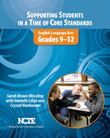Companion Resources for Supporting Students in a Time of Core Standards: English Language Arts, Grades 9-12
 This site offers companion materials for the book Supporting Students in a Time of Core Standards: English Language Arts, Grades 9-12 by Sarah Brown Wessling with Danielle Lillge and Crystal VanKooten. (Click here to purchase a copy.)
This site offers companion materials for the book Supporting Students in a Time of Core Standards: English Language Arts, Grades 9-12 by Sarah Brown Wessling with Danielle Lillge and Crystal VanKooten. (Click here to purchase a copy.)
Resources include:
- reproducible materials from the book
- links to the Common Core State Standards (CCSS) website, as well as to other standards-related sites
- links to NCTE position statements, guidelines, and publications
Section I: Observing the CCSS
Chapter 1: Demystifying the Common Core State Standards
Figure 1.1 Structural relationships of the CCSS (PDF)
Web 1.2 Updates on CCSS assessments from the Partnership for Assessment of Readiness for College and Careers (PARCC) and the SMARTER Balanced Assessment Consortium
Web 1.3 Visit the Teaching and Learning Forum in the NCTE Connected Community to discuss the CCSS with other teachers and to share your experiences.
Web 1.4 Examples of text complexity (see page 58 of this PDF)
Web 1.5 The Partnership for the Assessment of Readiness for College and Careers (PARCC) and the SMARTER Balanced Assessment Consortium
Section II: Contextualizing
Chapter 2: Everything’s a Conversation: Reading Away Isolation
Figure 2.1 Reading complexity circles (PDF)
Figure 2.2 Pathways to planning and enacting instruction (PDF)
Web 2.1 Appendix B of the CCSS, Text Exemplars and Sample Performance Tasks (large PDF)
Chapter 3: Using Viewing to Elicit Complex Thinking
Chapter 4: Integrating Active Listening and Speaking Strategies
Figure 4.1 Viewing grid (PDF)
Chapter 5: Writing Is a Thinking Process Shared with Others
Web 5.1 Appendix C of the CCSS, Samples of Student Writing (large PDF)
Section III: Building
Chapter 6: Individual Considerations: Keeping Students at the Center
Figure 6.1 Reading the CCSS with an example (PDF)
Figure 6.2 Planning with students at the center (PDF)
Figure 6.3 Questions for planning with students at the center (PDF)
Figure 6.4 Questions for planning template (PDF)
Figure 6.5 Unit plan template (PDF)
Figure 6.6 Year/course unit planning template (PDF)
Web 6.1 Resources on summative assessment:
Glossary of assessment terminology
A ReadWriteThink lesson that incorporates student assessment
The NCTE book Authentic Assessments for the English Classroom
Chapter 7: Working Collaboratively to Enact the CCSS
Web 7.1 Resources for building school-wide literacy initiatives:
The NCTE book Taking Initiative on Writing: A Guide for Instructional Leaders
A recording of the NCTE Web seminar “On Teaching Content: Building a Schoolwide Culture”
Information about the National Center for Literacy Education (NCLE)
Chapter 5, “Develop and Implement a Schoolwide Literacy Action Plan,” from the ASCD publication Taking Action on Adolescent Literacy by Judith L. Irvin, Julie Meltzer and Melinda S. Dukes
Web 7.2 Teachers as Readers: Forming Book Groups as Professionals (NCTE Guideline)
Web 7.3 Online forum: Learn about the NCTE Connected Community
Figure 7.1 Grade-level distinctions planning template (PDF)
Figure 7.2 Grade-level distinctions example (PDF)
Web 7.4 ReadWriteThink.org
Chapter 8: Becoming a Teacher Advocate
Appendix B: NCTE Principles
NCTE Principles Regarding Teachers as Decision-Makers
Features of Literacy Programs: A Decision-Making Matrix (NCTE Commission on Reading, 2005) PDF
Resolution on Scripted Curricula (2008)
Resolution on Affirming the Role of Teachers and Students in Developing Curriculum (2010)
NCTE Principles Regarding Reading Instruction
On Reading, Learning to Read, and Effective Reading Instruction: An Overview of What We Know and How We Know It (NCTE Commission on Reading)
NCTE Principles Regarding the Teaching of Writing
NCTE Beliefs about the Teaching of Writing (Writing Study Group of the NCTE Executive Committee, 2004)
NCTE Principles Regarding Teaching English Language Learners
NCTE Position Paper on the Role of English Teachers in Educating English Language Learners (ELLs) (NCTE ELL Task Force, 2006)
NCTE Principles Regarding 21st Century Literacies
21st Century Curriculum and Assessment Framework (2008)
NCTE Principles Regarding Assessment
Standards for the Assessment of Reading and Writing, Revised Edition
21st Century Curriculum and Assessment Framework (Joint IRA-NCTE Task Force on Assessment, 2009)
